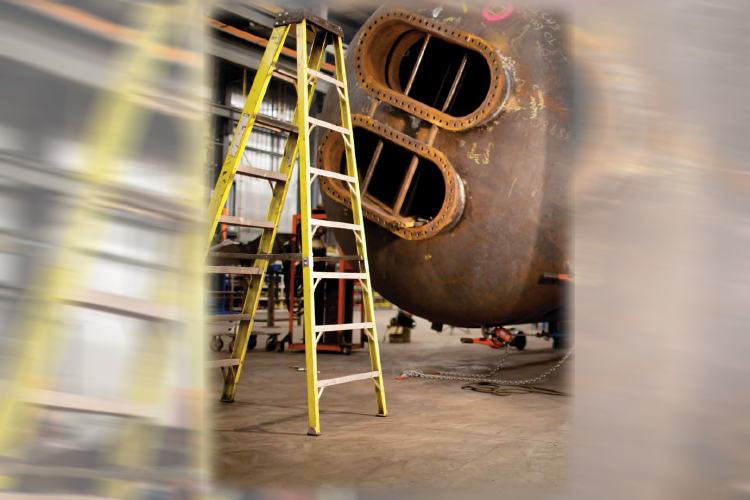If a business does not have a safety program to protect its workers, then that business should not exist, and if it does exist, the government should have every right to shut that business down.

| Date Published | June 20, 2013 |
| Company | Plains Fabrication |
| Article Author | Tom McCaffery |
| Article Type | June 2013 Issue |
| Category | Articles, Oil & Gas |
| Tags | Blasting & Painting, Flare Stacks, Hydro Testing, Indirect Fired Heaters, Instrument Tubing, Oilfield HUB Community Sponsor, Pressure Vessels, Skid Packages, Stainless Steel Welding, Structural Steel Fabrication |
| HUB SEARCH | PlainsFabrication |

If a business does not have a safety program to protect its workers, then that business should not exist, and if it does exist, the government should have every right to shut that business down.
The Albertan and Canadian governments both have some incredibly forward thinking people as elected officials in their collective employ. As in any large organization, that doesn’t necessarily mean that extends to every person. The reason I mention this up front is because our recent business activity has put us “in the room” with some of these people, and I have been extremely impressed. I have met MPs, MLAs, and various members of government organizations from the NRC to other three, four, and five letter acronym departments, and I quite frankly have trouble remembering them all. Please don’t ask me to tell you what they stand for! We at Plains meet a wide variety of individuals, as all of us in business do, but often the stigma is that the government is made up of politicians and bureaucrats, and that can be hard to overcome.
 For the purpose of this article, I hope the sentiment within reaches these forward thinking people in government. If we view the government as a large business, we can draw some parallels and maybe deal with a major concern we have involving Occupational Health and Safety (OH&S). I am speaking of the government’s move to control safety standard infractions by using a graduated system of fines.
For the purpose of this article, I hope the sentiment within reaches these forward thinking people in government. If we view the government as a large business, we can draw some parallels and maybe deal with a major concern we have involving Occupational Health and Safety (OH&S). I am speaking of the government’s move to control safety standard infractions by using a graduated system of fines.
Plains doesn’t take issue, in any way, with cracking down on businesses that do not conform to safety standards. Quite frankly, if a business does not have a safety program to protect its workers, then that business should not exist, and if it does exist, the government should have every right to shut that business down without question. Our entire industry takes safety seriously, so please do not misconstrue the true meaning of this article. Fines may seem like a viable option for the government to use to enforce safety standards, but I think that is shortsighted and this is why:
As a nation, we want our government to be fiscally responsible. We can see the evidence of what happens in the media when governments are not responsible, so when we (the voter) press the government to save, they often choose to cut. They cut department spending more often than they put money back in. In business we can’t throw money around either, and we often use a similar strategy. In those cases, it’s our employees who pay the price. We need to get as much as we can, for as little as we can, so we can make as much money as we can. It’s a shortsighted business strategy that many managers and owners employ, and I am proud to say we done’t use it. Sometimes it takes money to make money.
We can’t be spendthrifts in business or in government. I would never have made it as a manager these past 20 years if I had only spent money and never made any. I do not think when the government cuts spending it does so with truly thinking about the effects on the employee, or the manager who has to figure out a way to enact those cuts and continue to provide the exact same service. It is easy to remove funds in business, or in government, without having to spend much time thinking of the consequences. I can do so with the strike of a pen and the ramifications of that pen strike will fall to the managers below me. If I provide them with support and direction as well as sound  reasoning, then I am a good manager (and from experience, I can say this rarely happens). But effective managing is a skill few really understand.
reasoning, then I am a good manager (and from experience, I can say this rarely happens). But effective managing is a skill few really understand.
Picture this scenario: with the stroke of my pen I remove funding. You are the manager whose funding I have removed. You are responsible for the health and safety of the entire workforce and you have a staff of individuals trained at multiple levels who are required to ensure workplace safety. With a reduced budget, the number of trained individuals whose responsibility it is to maintain safety standards are all so reduced.
Ultimately, if things go wrong in your department, no one will take funding reduction into account. They will simply look to the person accountable, which just so happens to be you. You are still expected to provide the same level of service to all industries, and yet you are looking at reducing staff or programs. With the severe growth of companies in Alberta, you are responsible for a rapidly expanding number of companies. As the amount of companies increases, the task of overseeing them properly becomes impossible.
So the question asked of you is: how do we ensure businesses are following safety protocols? Well, businesses are all about the bottom line, so if we threaten to fine them for infractions then surely they will not flout our rules. And if they do, we will hit them where it hurts.
Now I’ll talk about the fines. This is not a new government strategy. I have seen it happen in Canada Customs. I was there on the front lines when they were first implemented. I went to the conferences to understand how they could affect the company I was working for at the time. Now they are instituting the same type of system in the world of OH&S.
However, using fines to enforce rules assumes that all staff members are created equal. Even though our staff members are intelligent and hardworking people, in the world of welding, not all journeymen are created equal. Not all journeymen would be given the same job even though they have the same ticket. If you task all of your staff with the same level of ability to levy fines, including the staff members who do not share the same experience or have the same full understanding of a very large set of rules and regulations that are written and interpreted by lawyers, you have a system that you are setting up for failure. This system will breed distrust between companies and the government based on monetary posturing. This is a short sighted whip and it’s like bringing a knife to a gun fight, but why make this about drawing a line in the sand?
 What I am saying here is that businesses and the government have the same interest at the heart of this issue: we want to keep employees safe. So let’s sit at the table and find a way to do this without becoming adversaries in a courtroom. Let’s do this as a team whose only interest is in seeing an entire workforce go home to their families at the end of the day. That is what we are really talking about here. That is really the only thing that matters. Fines are a crutch, and I know we can do better. Fines will not ensure people will be safe!
What I am saying here is that businesses and the government have the same interest at the heart of this issue: we want to keep employees safe. So let’s sit at the table and find a way to do this without becoming adversaries in a courtroom. Let’s do this as a team whose only interest is in seeing an entire workforce go home to their families at the end of the day. That is what we are really talking about here. That is really the only thing that matters. Fines are a crutch, and I know we can do better. Fines will not ensure people will be safe!